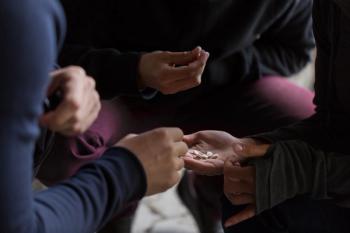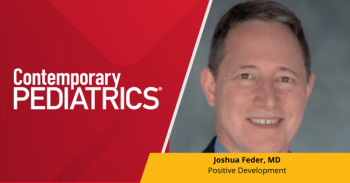
Pediatric mental health and social media
Candice Jones, MD, discusses the impact and potential impacts social media has on the lives of children and adolescents, and how it can impact pediatric mental health.
Contemporary Pediatrics®:
Hello and thank you so much for joining us. I'm Joshua Fitch with Contemporary Pediatrics®.
Candice Jones, MD:
Hi, everyone. I'm Dr. Candice Jones, I'm a board certified pediatrician, and I'm proud to be a editorial advisory board member for Contemporary Pediatrics®.
Contemporary Pediatrics®:
Dr. Jones, thank you so much for joining us, and we're certainly lucky to have you. Today we're talking about social media related to children and adolescents. First, with social media being such a huge force in today's world and with it being so prevalent among children and adolescents, what associations are there and when it comes to pediatric mental health?
Jones:
That's a great question and a good starting place. First, I would like to say that social media has its pros and cons. It certainly has some positive aspects for children, but there are some negative things that we do have to be honest about and discuss and protect children from, and I know that's what we're focusing on today, but just wanted to put that out there initially that there are pros and cons. Second, it's important to understand that social media platforms affect children's brains differently than adult's. Children's brains are still developing, so they are more vulnerable to the impact of these platforms, such as Snapchat, TikTok, Instagram, even YouTube and in Facebook. Starting around age 10, children's brains undergo a fundamental shift that spurs them to seek social rewards, including attention and approval from their peers. Some kids get smartphones around this age with access to these platforms, these social media platforms around this age, and this access has absolutely been linked to mental health problems, including anxiety, depression, symptoms, and body image concerns. This can start with seeking popularity, social comparison, and even editing selfie images. Another issue is the permanent and public nature of online interactions versus in person interactions. With a single post, there can be no response likes, or even negative comments, which influence mental health through those social rewards I mentioned earlier. So these are the ways in which social media just a few of the ways in which social media can impact the mental health of children and adolescents.
Contemporary Pediatrics®:
That you've noticed, how has social media affected other areas of children's lives or what are potential downstream effects of increased social media use among children and adolescents.
Jones:
You know, I encounter parental concerns quite often regarding excessive time on social media. And this, you know, has seemed to impact sleep, other healthy activities, and responsibilities that the youth should be engaging in, and even school performance. Kids also may engage in harmful social media challenges. We've seen this happen, they can pick up misinformation and disinformation, and even develop physical ailments such as wrist pain, headache, visual disturbance, like eyestrain, from excessive or just engaging in social media all too often. Interestingly, nearly half of adolescent girls on TikTok feel addicted to it or use the platform for longer than they intend, and this is a this is a finding reported by Common Sense Media. So even young people know it can be problematic, and it definitely has other impacts outside of the realm of mental health.
Contemporary Pediatrics®:
Do you think a reduction of social media via policy such as what we've seen in Utah can have a positive impact impact regarding mental health or can only time tell with this?
Jones:
I think the potential is there, but I do agree that only time will tell. We'll have to see the data after these policy changes occur to see if they have a positive impact or if they're if there's more problems that come out of it. Utah's social media policy in my opinion is well intended to protect kids, but I'm unclear as to how reliable it will be, because there's not much information as to what this implementation will look like. So definitely time will tell if it's helpful. Those measures in that bill, definitely are things that parents should be doing for their families and their children are regarding social media use anyway, and I think I do agree with what we are also seen with regulation and holding platforms accountable, to increase transparency, and also increase federal funding for studying the effects of social media on mental health. So there certainly is a lot of advocacy, a lot of policy and regulation that can be done to protect kids, and it's just the I guess the devil is in the details and how it's implemented and what the outcomes will be.
Contemporary Pediatrics®:
Certainly, and you mentioned, kind of what parents should be doing, what are some of those things? Or what do you recommend to parents if and when they say their child's behavior is changing due to social media, or they presume it's because of social media, they noticed a difference in their child's behavior?
Jones:
Yes, certainly, that's a great question. Certainly, parents should always monitor their kids, and if they're seeing changes, they definitely should talk to their child about what they're seeing and ask them questions in an open ended way to encourage dialogue and discussion with their child. But certainly, taking that conversation or that concern, as a double check to their pediatrician is crucial, or any professional, sometimes we just need that professional lens to make sure that as a parent, we need that professional lens, even me as a pediatrician, I would take that to my pediatrician, or to a mental health professional, to just make sure everything is okay. As a pediatrician, I recommend in a preventive and proactive way that parents discuss social media use, and set rules around social media with their kids before handing that over before they have the access. I also support the wait until the 8th pledge where you know, developmentally, children may not be ready for these smartphones and access to these social media platforms at an early age, especially at the age that we're seeing kids getting them now and so a safe, maybe a safe ages around 8th grade, 13, where you can have a discussion, set up rules and structure around social media use use and increase your child's social media use literacy to protect against some of those negative mental health impacts. And lastly, I recommend that families utilize the American Academy of Pediatrics, family media use plan, this is a wonderful platform that you can go and find on healthychildren.org or just Google the family media use plan and you can customize it to with your child's name for the age of your child, and use the age appropriate drop down boxes, to set up a plan that you can print out that specific to your child around timing on social media and just screens in general around what they can use and what they cannot use, and also giving them the information to protect themselves in that document. So these are some of the things that I recommend. But certainly if we see any changes in our children, then we should monitor further discuss and take that to our pediatrician at first line basis.
Contemporary Pediatrics®:
Dr. Jones, is there anything else you'd like to add kind of in the space between pediatric mental health and the vast world of social media?
Jones:
Yes, you know, certainly I think as providers as pediatricians and health care providers, we should be knowledgeable about about these platforms. I'm not, you know, encouraging you to get heavy into it and use it but be knowledgeable about what's out there, what kids are doing, how they're using it. Talk to your patients about this and ask this this topic into your anticipatory guidance to ask families and caregivers about the rules around social media use with their children, how they are protecting their kids and giving them that guidance on what the pros and cons are and certainly be familiar with these tools that we can use the wait till eight pledge, the AAP's family media use plan, all of these wonderful tools, Common Sense Media wonderful platform to help guide area their kids should be using and how they should be using based on their age. And so these tools are very helpful for us to navigate this space and protect kids so I just recommend that we become familiar and utilize them.
Newsletter
Access practical, evidence-based guidance to support better care for our youngest patients. Join our email list for the latest clinical updates.






